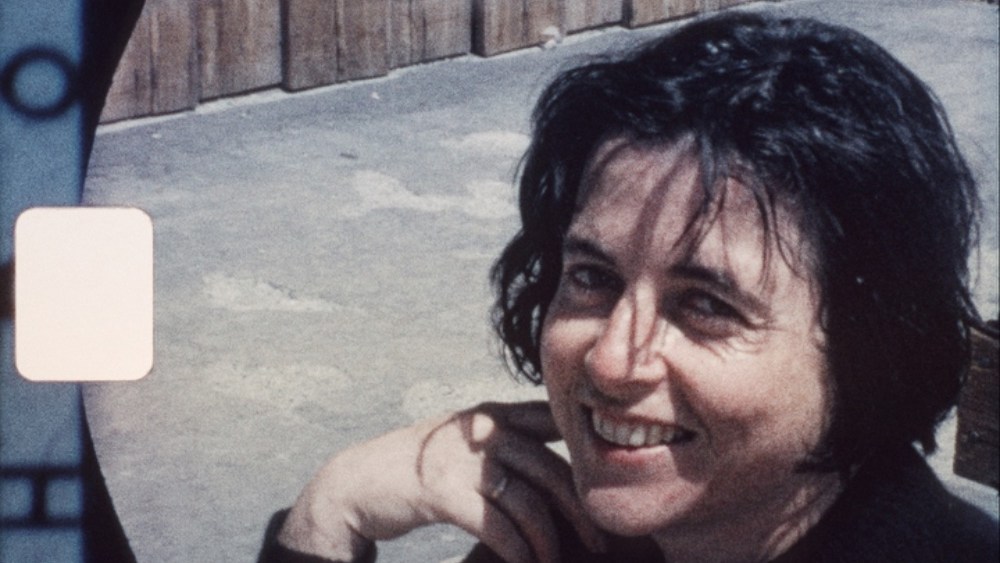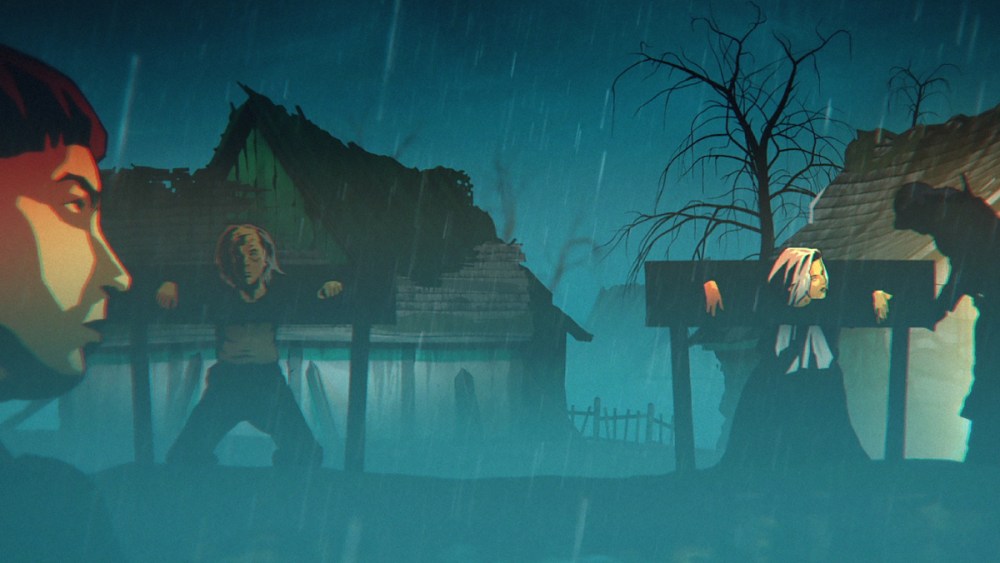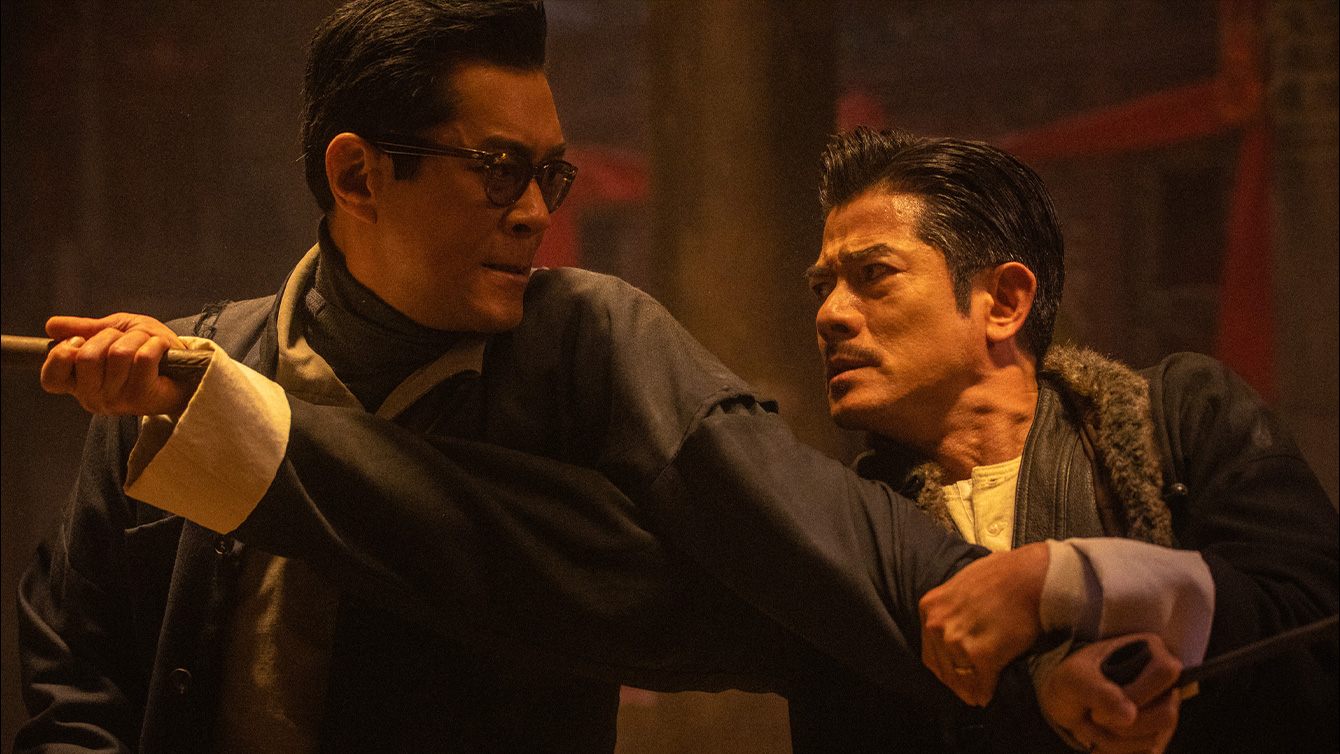‘Khartoum’ Co-Director on Filmmaking Amid War, Collective Authorship
As the Doha Film Festival launches its inaugural edition, the event marks its debut with a bold gesture: a sweeping Spotlight on Sudan that centers a country whose cultural output has often been overshadowed by political upheaval. Among the program’s most urgent titles is “Khartoum,” an inventive hybrid documentary crafted by a five-person directing team: Brahim “Snoopy” Ahmad, Anas Saeed, Rawia Alhag, Timeea Mohamed Ahmed, and British filmmaker Philip Cox.
The film follows a civil servant, a tea seller, a resistance committee volunteer, and two street boys whose stories converge as Sudan’s capital slides from civic unrest to full-scale war. Their experiences unfold through a blend of images shot on iPhones, stylized green-screen reconstructions, and animated dreamscapes that visualize the characters’ inner worlds and outer realities.
“Khartoum”
Courtesy of Native Voice Films
What screens in Doha as a centerpiece of the festival’s Sudanese showcase began in far more modest circumstances. The project originated in 2022 as a small documentary workshop led by Cox (Native Voice Films) in collaboration with producer Talal Afifi (Sudan Film Factory), with support from independent Sudanese media house Ayin Network. When war erupted in April 2023, production halted instantly and producers Giovanna Stopponi and Afifi redirected the remaining budget to evacuate the four Sudanese filmmakers to Kenya.
What might have ended the film instead became its turning point. With the support of DOCUBOX Kenya, the filmmakers found refuge in Nairobi. Determined to continue the film, the team began the painstaking task of locating and extracting their participants Khadmallah, Majdi, Lokain, Wilson, and Jawad from a city at war, navigating treacherous routes and months of uncertainty until eventually reuniting everyone in East Africa.
Since premiering at Sundance and screening at Berlinale, followed by engagements at Bertha DocHouse London and Edinburgh Filmhouse, “Khartoum” has been recognized for both its emotional force and its ambition. Its arrival at Doha’s inaugural festival positions the film at the center of an unprecedented celebration of Sudanese culture, a program that extends beyond cinema to music and art.
For co-director Brahim “Snoopy” Ahmad, whose own displacement echoes that of the film’s subjects, Doha’s focus carries a meaning that transcends the film’s festival trajectory. It is a rare moment when Sudanese filmmakers are invited to define their own narrative in a regional platform carving out space for their voices. In conversation with Variety, Ahmad reflects on collective authorship, the ethics of documenting trauma and the urgency of telling Sudan’s story from within, even when the filmmakers themselves can no longer return home.
How did “Khartoum” begin, and what first drew you to this story?
It actually started as a collaboration between Native Voice Films and Sudan Film Factory. They put out an open call for emerging filmmakers to submit ideas around a specific theme: telling stories about Khartoum in a poetic way.
We all applied, we got selected, and then we went through workshops to develop the stories and figure out how five different narratives could live inside one film. It’s not just five shorts back-to-back, so we had to find a way to intertwine them harmoniously, so it feels like one cinematic experience instead of a compilation.
We started shooting around October 2022 and kept going into early 2023. Then the producers and editor in London felt there were gaps, so we planned additional shoots for the end of April. The war broke out on April 15. Overnight, everything stopped and everyone was displaced. We couldn’t even find each other for a while.
How did the production survive that shock?
When the war started, the producers were trying to locate us, checking if we were okay, seeing what support they could give. Eventually I relocated to Kenya with our production manager. Then the producers asked, “Could Nairobi be a place to continue the film? To reassemble the team?”
Nairobi felt calm, vibey, like a place where we could breathe again. So slowly they brought the other directors out of Khartoum to join us. Once we were together, we had hard conversations: Do we finish this film? Do we change it? What does it mean now?
We decided we had to finish it because of the war, not in spite of it. It felt like a responsibility, a form of advocacy, because there wasn’t enough media coverage of what was happening in Sudan. In those first days I was filming for European TV, running around with a camera, and I realized cinema might be one of the few ways to explain what we’re going through in a deeper way.
The next challenge was: our characters were scattered too. So we started helping them get out of Khartoum and into Nairobi. Only once we were all in the same city again could we ask, “Okay, what story are we telling now?”
The film has five directors, which is unusual for a feature. What appealed to you about that collective approach?
The original idea was to show people living in Khartoum across very different social classes. Each director brought a distinct vision through the person they followed: from kids collecting bottles on the street, with no stable education and histories of displacement, all the way up to Majdi, a civil servant working in a secure government job.
Honestly, someone like Majdi is not from my usual world. I’m always on the street, so I know that level very well. But people like him, we see them, we don’t really know them.
People assume five directors means constant fights. Of course you have disagreements, and sometimes you have to step back from your “million-dollar idea” because, at the end of the day, it’s a team sport. When a team wins, the whole team wins, not one star player.
What helped is that I already knew all the other directors and had worked with them on shorts and videos before. That created a sense of camaraderie and safety. We weren’t starting from zero trust.
You’re filming people who’ve gone through extreme trauma. What were the toughest challenges for you on set?
From a logistics point of view, I don’t want to dramatize it too much. When you have experience and you prepare for what can go wrong, you hit fewer surprises.
The real challenge was emotional: how do we get these stories from our participants without re-traumatizing them? We had hours and hours of interviews, and we were always on standby. If someone started to feel overwhelmed, panic, sadness, any sign they were going back to a difficult moment, we’d hit what we called the “emergency button.” We’d stop filming, hug them, move to a safe space, remind them, “You’re here with us now. You’re not there anymore.”
The city of Khartoum almost feels like a character in the film. What did you want audiences to understand about it, beyond the headlines?
Whenever a city is destroyed, people remember it only as a city that was destroyed, the numbers of people that died, all of the rubble and the destruction. But every city has a soul, a culture. We wanted to archive that soul.
We were lucky to start filming before the war, when the city was still alive: Sufi rituals, coffee stalls on Nile Street, all those everyday events are what make Khartoum unique, what bring people together.
Of course, you can’t only show the beauty of the past and ignore the present. It’s not just memory, it’s the living condition. So the film holds both the destruction and what existed before. You see what has been lost, but you also understand what people are fighting to get back.
The film is full of hardship, but also moments of hope and humor. How did you find that balance?
We always focused on the human side. Humans don’t live only in tragedy, right? Even in the darkest times we have jokes, dreams, small joys. Those moments are what keep you going. When you lose hope, there’s nothing left to wait for.
We weren’t trying to give a fake hope. History shows that wars end, cities come back to life in some form. It might not be exactly the same, maybe less, maybe more, but there is a future.
For Sudanese people in the diaspora, what they miss most is the texture of Khartoum: the smell of rain, watering your backyard, coffee with family, eating together. By showing that, we’re saying: “This can exist again. We can go home.” That’s also our personal wish.
“Khartoum” has already screened at Sundance and Berlin. What surprised you about the reaction from international audiences?
Honestly, the size of the reception. Sudan rarely makes international headlines, and when it does, it’s usually overshadowed by “bigger” conflicts. So we didn’t expect packed screenings every time, but that’s what’s been happening.
People are showing up and really engaging with Sudan. I’m not saying our film alone changed the media landscape, but I do think it shook something. It gave people a clear, emotional explanation of what Sudan has been through in the last 30 years, both politically and in everyday life.
Have you been able to show the film to Sudanese audiences?
Yes, absolutely. In Nairobi, in Berlin, and in different cities where there are Sudanese communities. Wherever we have a screening, I try to make sure Sudanese people are in the room. I’ll post online, reach out to friends, and then they bring their friends, and it becomes a community event.
The reaction is always very emotional. People cry a lot. Even if they haven’t personally lived through war, many have left Sudan to study or work. Before, they always had the option of going home if things got too hard. Now that option is not so simple.
The film reconnects them with Khartoum, the city itself, the feeling of it. After the screenings, they often tell us it’s a powerful, deep film, but you can tell they still have so much more inside that they can’t even put into words yet.
Doha Film Festival is giving Sudanese cinema and music a major spotlight this year. What does it mean for you to be part of that showcase?
When I saw the DFF program and realized it wasn’t just our film and other films, it’s also Sudanese music, a whole dedicated Sudanese focus, I felt real joy.
As a filmmaker, of course I want my film to be seen. But to see music, art, all these other parts of Sudanese culture getting space too? That makes me proud. It means someone actually cares enough about Sudan to dedicate a whole section to it at a festival.
I’ve been to festivals that have small Sudan programs, or a human-rights sidebar. But a big regional festival like Doha building a full, visible platform for Sudan, I haven’t really seen that before.
And what does it mean that this focus is happening in the region, not just in Europe or North America?
This is our neighborhood. As much as I want the wider world to connect with us, it’s crucial that countries around us understand what’s happening because these are the places where we’re displaced the most.
I want people in the SWANA region (Southwest Asia and North Africa, used as a decolonial alternative to MENA) to realize displacement isn’t a choice. Staying home can mean risking your life, your health, everything. The moment it’s truly safe, we’ll go back.
You can be impressed by the roads, the buildings, and the malls in other countries. But after a while you realize: this isn’t life for you. Life is the community, the shared meals, the familiar smells and sounds. That’s what we’ve lost, and that’s what we want our neighbors to understand.
What do you hope the film’s festival run leads to?
The film is already traveling nicely in Europe, across the SWANA region, in Africa. I’d love for it to reach Latin America too, because there are so many parallels there like guerrilla warfare, resistance movements, dictatorships, people pushing back.
I don’t care if it’s on the biggest streaming platform or a smaller regional one. I just want “Khartoum” to be accessible in different parts of the world so people can get to know Sudan properly, through a film made by Sudanese filmmakers.
Western media has often misrepresented Sudan with its own agenda. A film like ours won’t be a perfect, objective portrait, nothing is, but it’s at least a depiction from the inside.
And what do you hope “Khartoum” does for Sudanese cinema?
I hope it inspires people. It’s not every day that a bunch of young Sudanese filmmakers make a film together and take it around the world.
My personal approach is to inspire by example: work hard, stay humble, and trust that it will pay off, even if it takes time. Making cinema in Sudan is extremely hard. There is no real industry. You’re building everything from scratch.
So as much as we want to keep making films, we also want to light a spark in others, to show that it is possible, and that their stories are worth telling.
Share this content:




Publicar comentário